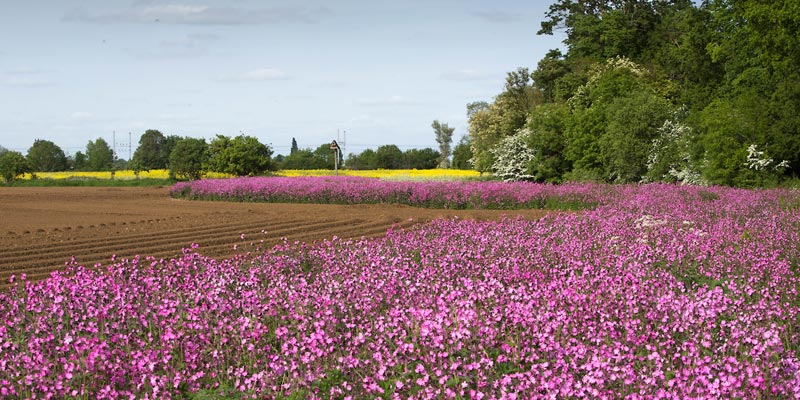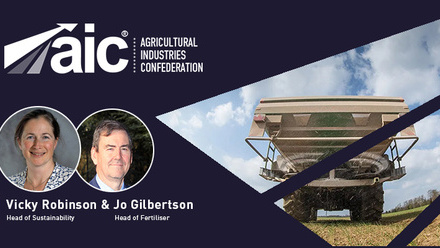"Welcome progress, more detail needed" on Government's Environmental Improvement Plan

The Agricultural Industries Confederation (AIC) has broadly welcomed the Department for Environment, Food, and Rural Affairs' (Defra) Environmental Improvement Plan, which provides much-needed direction from the Government on a wide range of environmental targets and ambitions.
The Plan, which was published yesterday (31 January), was described by the Prime Minister Rishi Sunak as "a blueprint not just to halt the decline of nature in our country, but to reverse it."
It lays out the environmental benefits and pressures identified by Defra, along with goals to achieve improved air and water quality, nature recovery, adaption to climate change, sustainable use of resources, and cutting waste, as well as managing exposure to chemicals and pesticides.
Pushing ELMs
Following Defra minister Mark Spencer's statement to the House of Commons on 26 January outlining a new set of standards for the Sustainable Farming Incentive 2023, the Environmental Land Management scheme (ELMs) forms a major part of the the Plan.
Find out more about the payments offered under the 2023 SFI standards, including significant incentives for taking BASIS and FACTS qualified advice, here.
Robert Sheasby, AIC's Chief Executive, said: "This Environmental Improvement Plan is welcome because it finally gives everyone involved in UK agriculture some clarity on what government wants to achieve on environmental protection and sustainable food production.
"That said, there is a lack of detail on certain aspects of the Plan, and we have some concerns about the practicality and feasibility of some of the targets set for water quality, for example.
"We will continue to listen to Members and represent their views to Government."
Key overview
A copy of the Environmental Improvement Plan, which is the Government's first revision of the 25 Year Environment Plan published in 2018, can be viewed and downloaded from the GOV.UK website.
Managing exposure to chemicals and pesticides
- Publish a revised UK national action plan for the sustainable use of pesticides to reduce the harm of pesticides and help farmers to transition to integrated pest management with investment and advice.
- Publish a new Chemicals Strategy in 2023 to set out our priorities for addressing risks from chemicals, how government regulation will be used and how a move to more sustainable use of chemicals ca be encouraged.
- Continue to use UK REACH to evaluate and manage the risks posed by chemicals to human health and the environment.
- Improve understanding of chemicals in the environment, building on our prioritisation and early warning system, to ensure regulation is targeted at the greatest risk.
Air quality
- Supporting farmers to reduce the impact of ammonia emissions.
- In 2023, consult on extending environmental permitting to dairy and intensive beef farms.
- Put in place measures to reduce emissions from inorganic fertilisers and organic manures.
- Defra has agreed a plan to reduce these emissions through an industry-led approach to be implemented through the Red Tractor assurance scheme and qualified advisors.
- Manage emissions from anaerobic digestion.
Water quality
- Incentivise sustainable land use and increase compliance with regulations to reduce agricultural pollution.
- Reduce nitrogen, phosphorus and sediment pollution from agriculture into the water environment by at least 40% by 2038, compared to a 2018 baseline.
- Interim target of 10% by 31 January 2028, and 15% in catchments containing protected sites in unfavourable condition due to nutrient pollution by 31 January 2028.
Adapting to climate change
- Farm level monitoring, reporting, and verification of greenhouse gas emissions aims to help enable farmers and other land managers to better understand their sources of emissions and open up new financial opportunities.
Animal feed and net zero
- Exploring innovations at different stages of development, including methane inhibiting feed technologies for livestock.
- In 2023, Defra will publish a government response to the call for evidence on methane suppressing feed products, which could support more sustainable beef and dairy production. Defra recognises the potential for feed technologies to help decarbonise livestock farming systems.
- In November 2022 AIC responded to Defra's call for evidence on behalf Members, highlighted the pioneering technologies, practices, and innovations available to feed companies and their livestock farming customers. Read more here.
- Using new provisions in Environment Act to make it illegal for larger businesses operating in the UK to use key commodities grown on land that is illegally occupied or used, the Government will seek to operationalise these provisions through secondary legislation. Businesses in scope will also be required to undertake a due diligence exercise on their supply chains, and to publicly report on this every year.
Defra Secretary Thérèse Coffey said: "With new powers and duties from the Environment Act, Agriculture Act and Fisheries Act, we have laid the foundation stones for our drive to halt the decline of nature by 2030 – our most critical target of all.
"Driven by data and dashboards, this will be a decade of delivery with target-led, targeted actions towards leaving our environment in a better state than we inherited."
Delighted to launch our #EIP23 today - a plan for delivery putting nature on the road to recovery pic.twitter.com/O48XlW4eTv
— Thérèse Coffey (@theresecoffey) January 31, 2023
Read the Secretary of State's full speech to launch the Environmental Improvement Plan on the GOV.UK website.



